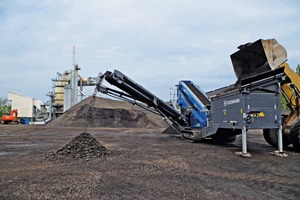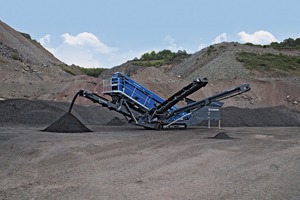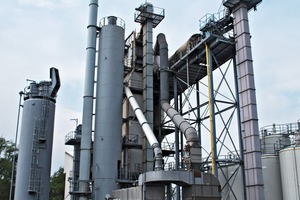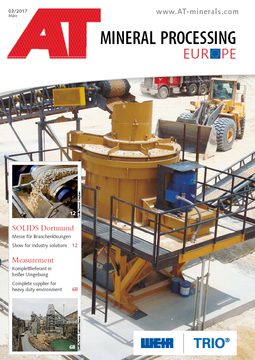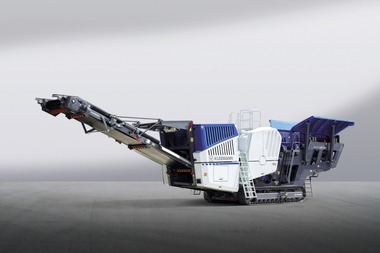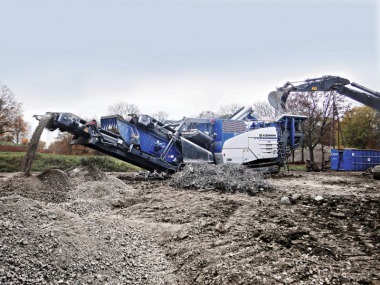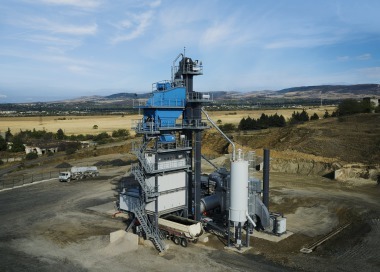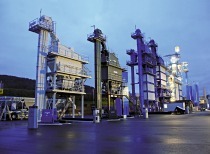Increased efficiency in asphalt recycling
In Germany alone, 12 mill. t recycled asphalt are currently produced and reused yearly – from a total of 40 mill. t. This large figure clearly indicates the huge potential of recycling technologies. With the introduction of systems and technologies from KLEEMANN and BENNINGHOVEN, operators of asphalt mixing plants are improving their process efficiency (Fig. 1). One particularly impressive example is provided by the Juchem Group, a long-standing customer of the WIRTGEN GROUP. The construction company has invested in four KLEEMANN MOBISCREENs for screening cut material – and in this way to improve the efficiency and quality of asphalt production in BENNINGHOVEN mixing plants.
New efficiency in the recycling process – with from the Wirtgen Group
For the Juchem Group, recycling used asphalt is part of its daily business. WIRTGEN cold cutters supplied by different cutting service providers remove road surfaces needing remediation layer by layer. After transport of this qualified material to the Group’s asphalt mixing plants, processing follows – with equipment supplied by KLEEMANN and BENNINGHOVEN. The goal is to obtain fractions with maximized homogeneity to form the basis for a high-quality finished product. For this purpose, the cut material is first screened thoroughly. For this process step, the Juchem Group has been using four MS 16 D and MS 16 Z MOBISCREENS from KLEEMANN (Fig. 2) for some months now. These are operated in combination with one BENNINGHOVEN BA asphalt mixer for each screen at the Landau, Niederwörresbach, St. Wendel and Ürzig sites.
Step 1: Extraction and analysis of material for recycling
In remediation projects managed by the Juchem Group, WIRTGEN cold cutters remove the surface, binder and base courses and extract three different fractions. For each project, often 3000 t cut material is collected – in one work course. “To guarantee high-quality application, we analyse the recycling material meticulously in our own laboratory and then select what we can use,” says Dr. Hermann Heppenheimer, Branch Manager at the Asphaltmischwerk Landau Juchem KG. “Moreover, the material has to be very homogeneous to allow further processing – and for this we require perfect processing techniques.”
Step 2: Screening with KLEEMANN mobile screens
Next, KLEEMANN mobile MOBISCREENS are used. Immediately after delivery of the cut material, these ensure that up to 80 % of the recycling material can be processed directly. Only the oversize is reprocessed in a granulator. This substantially lowers process costs compared to reprocessing of the entire cut material. As the already classified material is sometimes stored in the open and can absorb water depending on the weather conditions, if necessary any fines < 5 mm can be screened off and then stored dry. At the same time, this significantly lowers the energy consumption of the asphalt mixing plant. The rule of the thumb is: 1 % less moisture corresponds to one litre less heating oil for one tonne of mixed material.
These facts prompted the Juchem Group to buy no fewer than four KLEEMANN MOBISCREENs – three MS 16 D three-deck screens and one MS 16 Z two-deck screen. In operation at Juchem, the MS 16 D has a throughput of 150-300 t/h. Here the feed material (0-150 mm) in screened into the following grades – depending on the asphalt recipe of the mixing plant: 0-8, 0-11, 0-16, 0-22 or 0-32 mm. With finer screening surfaces, the throughput rate is lower, but the focus is on obtaining a homogeneous product for further processing. Here, another of KLEEMANN’s strengths plays out: With a large number of screening surfaces in combination with the uncomplicated replacement, the operators are given wide flexibility. The driver can feed the MS 16 D and control it at the same time by remote control. All components of the screen are also easily accessible and very maintenance-friendly as a result.
Step 3: Mix material production in BENNINGHOVEN asphalt mixing plant
At the Juchem Group mixing plants, the screened cut material is processed to a new mix. And that is since 1999 when investment was made in one of the first parallel drums in the Rhineland Palatinate (Fig. 3). “Investments in recycling feed systems from BENNINGHOVEN have improved our competitiveness,” reports Dr Heppenheimer. Juchem has retrofitted several of its asphalt mixing plants with different systems. The combination of systems - multivariable feed systems and parallel drums – creates flexibility. The use of parallel drums, a hot feed system, is worth it for large volumes and high recycling feed quotas up to 70 %. In addition, Juchem uses the multivariable cold feed system. Here the recycling material is intermittently fed direct into the mixer, the possible feed quota is 40 %. Why does Juchem integrate both systems in its recycling process? “This gives us the flexibility we need. With the multivariable feed system, we can cover very small volumes from 2 t. And with the parallel, drums we can process large orders. The two systems are fully developed and deliver first-class quality,” explains Dr Heppenheimer.

